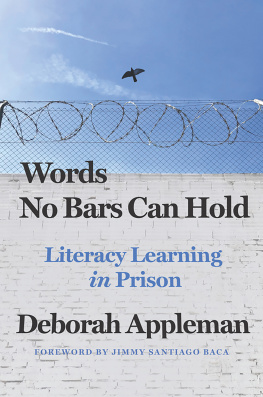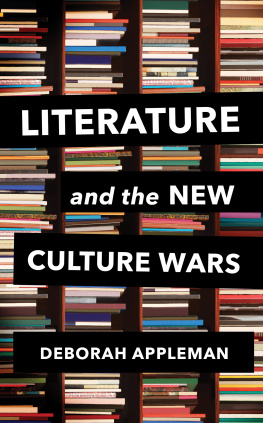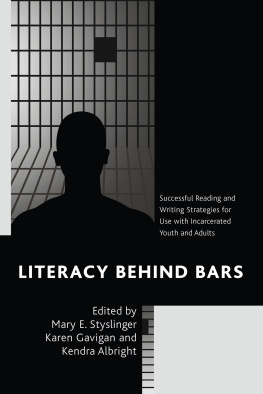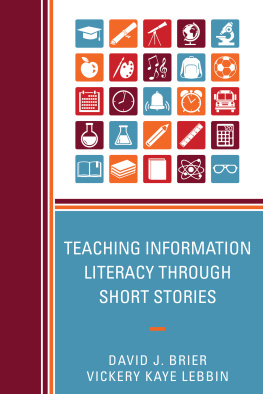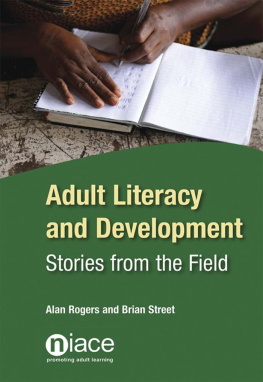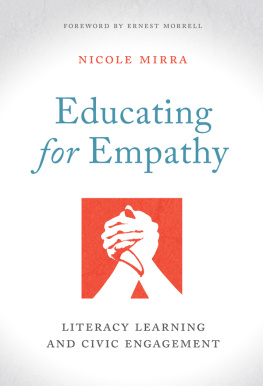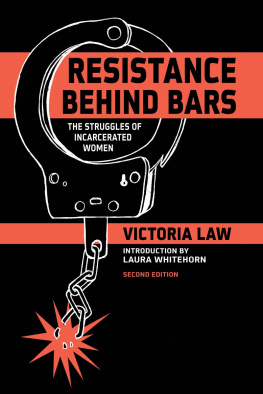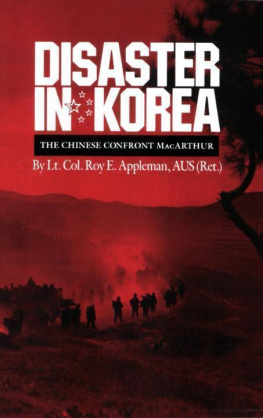Contents
Guide

Advance Praise
The equitable distribution of powerful literacy education is among the most serious human rights issues of our time. Far beyond mere reading and writing, Appleman reminds us that a true learning is an act of Freedom. In this perspective, she joins a long tradition of activists, revolutionaries, gurus, newly emancipated slaves, artists, and griots who have spoken of the liberatory power of the Word. Appleman is the conscience of the field when it comes to emancipatory education for the incarcerated and her newest work offers a pedagogical and moral challenge to educators and others interested in social justice and a truly human dialogue. In Words No Bars Can Hold , Appleman introduces us to the pedagogical theories and the stories of real people who want what we all want, to live lives of decency and dignity and to be heard and listened to. An educator cannot read this book without being challenged to see all people differently, to recognize his or her complicity in the prison industrial complex, and to insist on literacy instruction rooted in agency, voice, power, and love.
Ernest Morrell, Ph.D., Coyle Professor in Literacy Education, Professor, English and Africana Studies, Director, Center for Literacy Education, University of Notre Dame
Deborah Appleman brings a wealth of experience to this stirring and thought-provoking account of teaching in prison. Reading it, we learn so much about the power of writing, about teaching, about what education makes possible, and about the urgent human capacity to define who we are.
Mike Rose, author of Back to School: Why Everyone Deserves a Second Chance at Education
In Words No Bars Can Hold , Deborah Appleman culminates years of teaching and writing in a book that spans spaces rarely brought together: the public school, the liberal arts college, and the community of prison authors. The result is an eloquent meditation on how the art of narrative defines what it is we mean by education itself, and its centrality to what Appleman calls the potential for self-rehabilitation. An extended celebration of critical pedagogies, it persuades its readers by devoting many of its pages to extended selections from the writings of accomplished authors who have been, or still are, incarcerated.
Daniel Karpowitz, author of College in Prison: Reading in an Age of Mass Incarceration
Words No Bars Can Hold sharpens our analysis and does the necessary work to break our hearts. Deborah Applemans evocative writinga powerful form of witnessing to the lives and literacies of people who struggle to survive life in a cagepropels readers to recognize that we must build the world we need and imagine and make other pathways to accountability, to healing, and to justice that do not involve death by incarceration. Our lives and communities depend on it. Written with a fluid and accessible voice, this essential text invites a wide range of readers to view radical literacy work as a key tool to strengthen national movements to end our prison nation.
Erica R. Meiners, Ph.D., Bernard J. Brommel Distinguished Research Professor, Northeastern Illinois University
Do the liberal arts actually liberate? Deborah Appleman proves they can. Her work with incarcerated students demonstrates the power of reading, critical thinking, and creative writing to change lives from the inside out. Words No Bars Can Hold is a guidebook both for those looking to improve education within correctional institutions as well as for those of us working to keep students far away from the school-to-prison pipeline. An important book.
Carol Jago, high school English teacher, past president of the National Council of Teachers of English, author of The Book in Question: Why and How Reading Is in Crisis
From the prelude to the conclusion, Applemans book is dripping with kernels of humanity. Her life and commitment to the role of education for those behind bars signal what it means to be a disciple of good. I anticipate this will become a seminal text for those who want to educate men in one of our nations darkest spaces.
Alfred W. Tatum, Ph.D., Dean, UIC College of Education

Words
No Bars Can Hold
Literacy Learning in Prison
DEBORAH APPLEMAN

Note to Readers: Models and/or techniques described in this volume are illustrative or are included for general informational purposes only; neither the publisher nor the author(s) can guarantee the efficacy or appropriateness of any particular recommendation in every circumstance.
The Last Visit From the Girl in the Willow Tree reprinted by permission of PEN America
PEN America stands at the intersection of literature and human rights to protect free expression in the United States and worldwide. The organization champions the freedom to write, recognizing the power of the word to transform the world. Join, follow, and donate at pen.org.
Copyright 2019 by Deborah Appleman
All rights reserved
First Edition
For information about permission to reproduce selections from this book, write to
Permissions, W. W. Norton & Company, Inc., 500 Fifth Avenue, New York, NY 10110
For information about special discounts for bulk purchases, please contact
W. W. NortonSpecial Sales at specialsales@wwnorton.com or 800-233-4830
Book design by Vicki Fischman
Production manager: Katelyn MacKenzie
The Library of Congress has cataloged the printed edition as follows:
Names: Appleman, Deborah, author.
Title: Words no bars can hold : literacy learning in prison / Deborah Appleman.
Description: First edition. | New York : W.W. Norton & Company, [2019] | Includes bibliographical references and index.
Identifiers: LCCN 2018050856 | ISBN 9780393713671 (hardcover)
Subjects: LCSH: PrisonersEducationUnited States. | CriminalsRehabilitationUnited States. | Literacy programsUnitedStates. | Education and crimeUnited States.
Classification: LCC HV8883.3.U5 A66 2019 | DDC 365/.6660973dc23
LC record available at https://lccn.loc.gov/2018050856
ISBN 9780393713688 (ebk.)
W. W. Norton & Company, Inc., 500 Fifth Avenue, New York, N.Y. 10110
www.wwnorton.com
W. W. Norton & Company Ltd., 15 Carlisle Street, London W1D 3BS
Dedicated to the memory of two extraordinary mothers
F AYE A PPLEMAN W EIL
P AMELA J. C ALIGUIRI
Also by Deborah Appleman
Adolescent Literacies: A Handbook of Practice-Based Research
Editor, with Kathleen A. Hinchman
Teaching Literature to Adolescents , Third Edition
with Richard Beach, Bob Fecho, and Rob Simon
Critical Encounters in Secondary English: Teaching Literary Theory to Adolescents, Third Edition
UnCommon Core: What the Authors of the Standards Got Wrong About Instructionand How You Can Get it Right
with Michael W. Smith and Jeffrey D. Wilhelm
Reading Better, Reading Smarter: Designing Literature Lessons for Adolescents
with Michael F. Graves
Adolescent Literacy and the Teaching of Reading: Lessons for Teachers of Literature
From the Inside Out: Letters to Young Men and Other Writings, Poetry and Prose from Prison
Editor
Reading for Themselves: How to Transform Adolescents into Lifelong Readers Through Out-of-Class Book Clubs
Braided Lives: An Anthology of Multicultural American Writing

